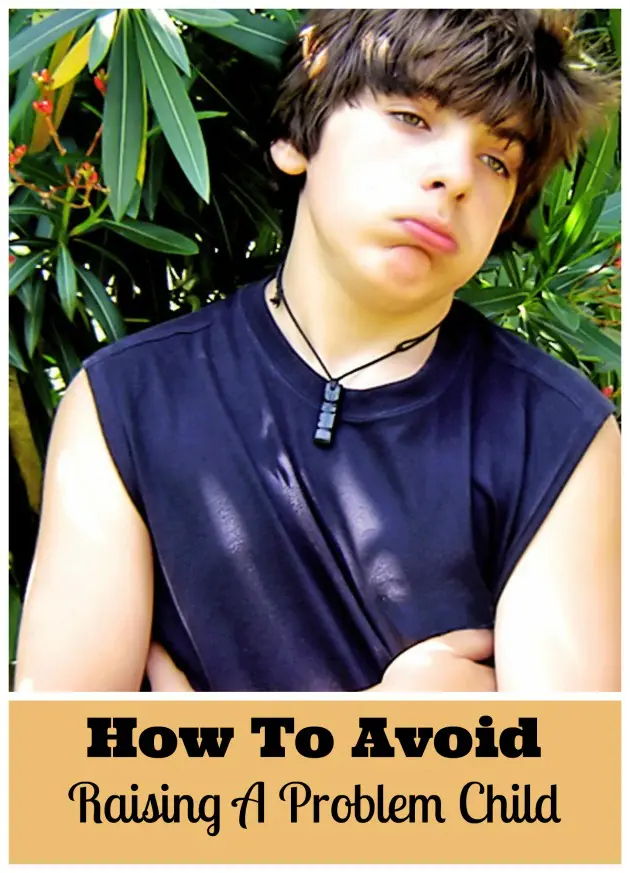Every parent wants to raise a responsible, respectful child, not a “problem child” with behavior problems. Nevertheless, it seems that sometimes parents with the best of intentions end up with a child they have no idea how to handle. Today, I have a guest post from Sam Benkoczy who is a husband and father of four that has been involved with youth education since 1997. His main method of dealing with discipline issues has evolved from yelling and threats to more subtle and effective ways over the years. Here are his best tips to avoid raising a problem child.
How To Deal With A Problem Child
Parenting a child with behavioral challenges can feel overwhelming, isolating, and emotionally draining—but you’re not alone. Whether you’re navigating frequent outbursts, defiance, or difficulty following rules, it’s important to remember that these behaviors often signal a deeper need for support, structure, or connection. Understanding the “why” behind your child’s actions is the first step toward finding real, lasting solutions. With patience, consistency, and the right tools, you can help your child develop healthier ways to express themselves—and restore a sense of calm and connection in your home.
What is a problem child and what makes them so difficult?
by Sam Benkoczy
In early May, I was in a school meeting discussing some discipline incidents that had happened the previous week (I work at a boarding school). Someone suggested to make a list of ‘problem children’ in order to come up with a good strategy to deal with them. While I’m all for helping children, who find it hard to follow rules even to the point of applying fair consequences that help the child, I can see two fundamental problems with the term ‘problem child’.
On one hand there is the labeling, which leads to frustration with himself and low self-esteem in the young one. Once declared a problem child he will often want to live up to his reputation. He will do more of the same that resulted in him being labeled as such. It’s almost like a self-fulfilling prophecy. Think of the last time being labeled got you enthusiastic to improve and gave you encouragement to overcome a problem. It doesn’t even work with adults, so why would it with children?
Another reason why the term is problematic – and this requires a lot of humility and an honest look in the mirror – is that when you declare your child a problem child, it means that you’ve given up on him, and have retreated into reactive mode. As a parent you’re called to lead your child, and this leadership requires you to be proactive.
Children beg, nag, disobey, misbehave, show disrespect, upset us and make us lose our patience in many ways. Notice though that begging, nagging, disobeying, misbehaving and showing disrespect are things children do or attitudes they display, while getting upset and losing our patience are realities we experience as parents. We then declare that our child is a problem child because of the difficulties and frustrations we experience. The underlying problem is that such parents often only treat symptoms and react to circumstances and misbehavior. However, they do not assume an active role in shaping their children’s lives.
While it is true that the child might have a problem, he only becomes the problem in the measure you allow yourself to identify him with his problems. When you declare him a ‘problem child’ you capitulate. This basically a parent child relational problem.
Thankfully my colleagues were receptive to my comments. We made a list of students who need regular attention instead of problem-children. It seems a tiny change of terminology, but in reality it reflects a big change in mindset. At home we face the same choice: am I going to declare my child a problem child and thus make him into one?

How to avoid raising a problem child
If a child is being identified as a “problem child” who is hard to raise and constantly vexing to deal with, change your perspective. There is a good chance that child is having issues they need help working through. They are probably not the problem. Rather they don’t know how to deal with the real problem and are acting out. Family counseling may be helpful in this case.
Distinguish bad habits from willful actions.
Your child disobeying you is very distinct from him regularly failing to tidy up his room. The latter is a bad habit and can lead to constant friction, while the former is the result of a conscious decision. They both can be helped, but you need to approach each situation differently.
Concentrate on the issue at hand
When you correct your son it’s not about you, and most of the time it is not about him either, but rather about the action or the bad habit that you want to address. If you find out that he’s lied to you about drinking, for example, in the first instance don’t focus on how he’s betrayed you and what you need to suffer because of his dishonesty. Instead, focus on the problem: why did he drink and how could he have avoided it? You know pretty well why he lied to you about it, don’t you? He didn’t want to disappoint you or get you mad; he was ashamed. You can reflect with him on the element of trust once you’ve dealt with the core issue.
Communicate the right message
You don’t have to say ‘You’re a problem child’ in order to communicate just that. When you face negative behavior or want your child to change a bad habit make sure that he perceives you as his ally, and not as his enemy. That is essential to getting the right message across. The use of words plays an important role so strive to consciously develop your vocabulary.
Avoid phrases like “Why do you always…”, “You never…”, “It’s really annoying when you…”. They cause the defense mechanism to go up immediately, and either directly or on a subconscious level you meet resistance. You will have much more success with phrases like “I’ve noticed that recently you have…”, “Son, I’d like to talk to you about…”. If you need to have a serious conversation, it’s a good idea to offer your child to opt in. “I’d like to talk to you about something that is very important to me, but only if you give me permission”. More often than not he will say yes. This buy in means that he will be more receptive to what you’re about to say.
Avoid correcting in the heat of the moment.
If your child defies your authority, for example, there’s obviously something that prevents him from being respectful in that moment. Changing that something there and then is likely impossible. In these moments you will be tempted to look for a magic sentence to fix the situation. However, there’s no quick fix solution out there. In such instances you need to tell your child: “Look, neither you nor I are ready to talk about this now, but we will need to sit down to reflect about this when we’re both calm”. This will allow you both to look at what needs to be addressed from a distance. This will help give you more objective perspective, nearly from a third person’s viewpoint. Be sure though to look for a moment to reflect on his behavior, otherwise you discredit yourself.
Take into account and empathize with human nature.
As upsetting as it can be for you, being lazy, choosing the easy option, being superficial often come from human nature. We as adults are just as susceptible to it as our children (even if over the years we have become masters of finding explanations). Quite often all it takes for a child to start changing a bad habit or attitude is to know that they’re not walking alone. It is comforting to know that mom and dad (have) experience(d) the same difficulties as they do.
Don’t just focus on the tactic, but on building a trusting relationship.
Just as there are many ways to raise a problem child, there is also more than one way to correctly handle those situations that could lead there. The most important condition is that you nurture a relationship with him where trust can grow. Even if it’s difficult for you to trust him in a certain period of his life, you must always be there so he can trust you. This will help to keep open the communication channels.
Conclusion
It requires constant conscious effort to change your problem child mindset. It doesn’t happen overnight and it isn’t something you obtain in a specific moment and have it for the rest of your life. You must be humble and brutally honest with yourself to recognize your own limitations and mistakes. The change is as much about you as about your child.
While parenting a child with behavioral issues can be incredibly challenging, it’s important to remember that every child wants to feel seen, heard, and understood. With consistent boundaries, compassionate communication, and the right support—whether from professionals, trusted resources, or your own parenting community—you can help your child grow and thrive. What may seem like “problem behavior” is often a cry for help or connection. With patience and perseverance, positive change is possible. If you are trying, you’re not failing. You’re learning, adapting, and doing your best, and that makes all the difference.
I hope you find these tips helpful. After reading this, I hope you decide you don’t have a problem child at all!
Related Posts:
10 Benefits of Spending Time With Family


Ask Helen says
I can’t help but agree in everything that is written here. I think it’s really important to communicate with them more often for us to know them more and understand them better. I’ll definitely share this to my friends. 🙂